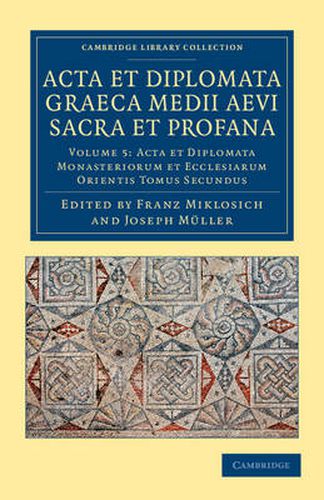Readings Newsletter
Become a Readings Member to make your shopping experience even easier.
Sign in or sign up for free!
You’re not far away from qualifying for FREE standard shipping within Australia
You’ve qualified for FREE standard shipping within Australia
The cart is loading…






This six-volume work, published between 1860 and 1890, contains a selection of documents in Greek which throw light on the history and politics of the Byzantine Empire in the Middle Ages. The editors, Franz Miklosich (1813-91), philosopher, linguist and Slovenian nationalist, and Josef (or Giuseppe) Muller (1823-95), a Greek scholar who also translated many important works by German classical historians into Italian, used as one of their sources the volumes of Greek manuscripts brought back to Vienna by Ogier Ghiselin de Busbecq (1522-92), the Flemish diplomat, herbalist, and travel writer who had acted as Imperial Ambassador to the Sublime Porte. Volume 5 (published in 1887) reveals the efforts of churches and monasteries to maintain their rights and status with regard to the Orthodox hierarchy, and also in the context of political upheaval: the King of Serbia and the Doge of Venice are among those involved.
$9.00 standard shipping within Australia
FREE standard shipping within Australia for orders over $100.00
Express & International shipping calculated at checkout
This six-volume work, published between 1860 and 1890, contains a selection of documents in Greek which throw light on the history and politics of the Byzantine Empire in the Middle Ages. The editors, Franz Miklosich (1813-91), philosopher, linguist and Slovenian nationalist, and Josef (or Giuseppe) Muller (1823-95), a Greek scholar who also translated many important works by German classical historians into Italian, used as one of their sources the volumes of Greek manuscripts brought back to Vienna by Ogier Ghiselin de Busbecq (1522-92), the Flemish diplomat, herbalist, and travel writer who had acted as Imperial Ambassador to the Sublime Porte. Volume 5 (published in 1887) reveals the efforts of churches and monasteries to maintain their rights and status with regard to the Orthodox hierarchy, and also in the context of political upheaval: the King of Serbia and the Doge of Venice are among those involved.